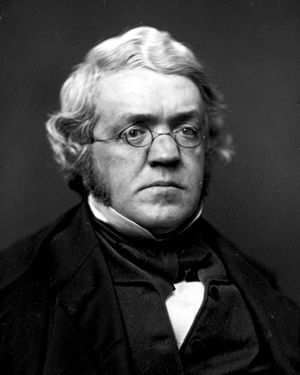The Legend of Saint Sophia of Kioff
William Makepeace Thackeray
AN EPIC POEM, IN TWENTY BOOKS. [Extract]
I. The Poet describes the city and spelling of Kiow, Kioff, or Kiova.
A thousand years ago, or more,
A city filled with burghers stout,
And girt with ramparts round about,
Stood on the rocky Dnieper shore.
In armor bright, by day and night,
The sentries they paced to and fro.
Well guarded and walled was this town, and called
By different names, I'd have you to know;
For if you looks in the g'ography books,
In those dictionaries the name it varies,
And they write it off Kieff or Kioff, Kiova or Kiow.
II. Its buildings, public works, and ordinances, religious and civil.
Thus guarded without by wall and redoubt,
Kiova within was a place of renown,
With more advantages than in those dark ages
Were commonly known to belong to a town.
There were places and squares, and each year four fairs,
And regular aldermen and regular lord-mayors;
And streets, and alleys, and a bishop's palace;
And a church with clocks for the orthodox--
With clocks and with spires, as religion desires;
And beadles to whip the bad little boys
Over their poor little corduroys,
In service-time, when they DIDN'T make a noise;
And a chapter and dean, and a cathedral-green
With ancient trees, underneath whose shades
Wandered nice young nursery-maids.
[The poet shows how a certain priest dwelt at Kioff, a godly clergyman, and one that preached rare good sermons.]
Ding-dong, ding-dong, ding-ding-a-ring-ding,
The bells they made a merry merry ring,
From the tall tall steeple; and all the people
(Except the Jews) came and filled the pews--
Poles, Russians and Germans,
To hear the sermons
Which HYACINTH preached godly to those Germans and Poles,
For the safety of their souls.
